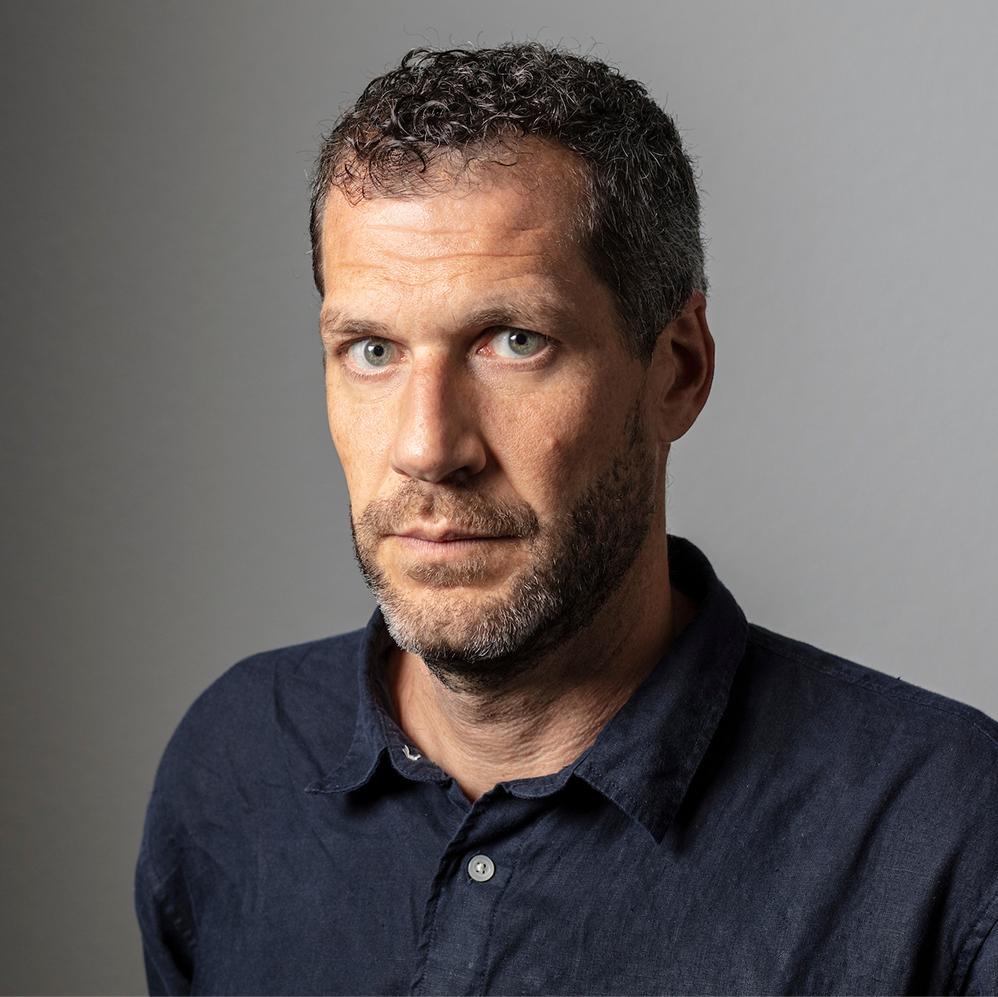‘Live simply to let others simply live’

Mirko Locatelli is a hardline critic of consumerism and the Western ideology of growth. The native Italian speaker, who lives in canton Vaud, is a dedicated degrowth activist, but says he’s no preacher.
“After the Second World War and until the 1973 oil shock, our parents believed that everybody benefited from economic growth. But 30 years of liberalism and unrestrained deregulation, the legacy of Reaganomics and Thatcherism, put an end to this grand illusion once and for all,” says the 32-year-old family man.
“Now is the time to think about change,” he adds.
Locatelli has begun to put theory into practice. He has neither a car nor a mobile phone, he lives without television and refuses to take an airplane.
“We have to live simply to let others simply live. The first step of degrowth is to do away with inequalities.”
Born and bred in Ticino, he now lives in the French-speaking town of Moudon in western Switzerland together with his wife and his 18-month-old son.
Sitting in a small café at Lausanne’s main railway station, Locatelli wants to set the record straight before he answers the first interview question.
”I have a political and social project, but I do not want to serve as a model. I despise any sort of preaching. It is possible to be a degrowth campaigner without being a nuisance to others.”
Idealist…
That settled, Locatelli turns his sights on intensive farming methods, blaming them for causing irreparable damage to the environment. He admits though to “eating meat from time to time”. And despite his anti-car stance he realises that many people have no choice but to drive.
“In Ticino for example there is often no public transport to the remote areas after seven in the evening. In many cases it is also impossible to find a job without having an e-mail address or a mobile phone.”
Locatelli is nevertheless an idealist and one of the founding members of a network of degrowth militants that has existed in several Swiss cantons over the past four years.
Together with two activists he launched a French-language magazine, Moins [Less], last December. The bi-monthly publication has so far about 500 subscribers in French-speaking Switzerland.
… and pragmatic
Locatelli also has a down-to-earth side to himself which might partly be due to his family background.
His own father, a former railway employee who originally trained as a butcher, has been living on disability insurance benefits after an accident at work. His mother works as a home carer.
“The value of work has always been key for my father. To praise him as a hard worker was the ultimate compliment. It was difficult for him to find a new purpose in his life after he had to give up his job for health reasons.”
Locatelli went against the expectations and views of his parents in many ways, and now works however part-time at a hostel for illegal immigrants in the city of Lausanne.
His father is proud to have voted for the centre-right Radicals all his life. In Ticino, as in many other alpine cantons, calling someone a Social Democrat – the centre-left party which traditionally represents the interests of low-paid workers – is almost an insult according to Locatelli. “It was my way of living a full-blown adolescent crisis,” he quips.
Political interest
Locatelli first became involved in politics back in 1998. At college he joined a student movement opposing plans for public funding of private schools in Ticino. Later, when he moved to Fribourg in western Switzerland to pursue his studies as a social worker, he joined several anti-globalisation movements and support groups for illegal workers.
Clearly to the left of the political spectrum, he has never been tempted to take part in institutionalised politics though.
“Degrowth is a dirty word for political parties. Although some of them, like the Greens, try to limit the damage done by the capitalist system, they are unwilling to push for fundamental change,” he says.
“The productivist dogma is still deeply rooted among the Left and the trade unions.”
Privileges
Locatelli’s wife works as researcher at Lausanne University. They met after she had finished her studies.
“We share more or less the same values, but she is more radical than I am,” he says, while his young son, André, sleeps in the pram ignoring the gesticulations of his father in the Lausanne café.
“In our society people define themselves through their jobs,” says Locatelli. “I like to make a point by saying that I have a family and I’m a dedicated father. Apart from that, I’m involved in grassroots activities.”
The couple earns just over CHF6,000 ($6,200) a month, but lives on less than CHF4,000. In Switzerland the average household income is around CHF7,400.
Locatelli knows he holds a privileged status. If he were an employee in the hotel business he would make CHF3,800 a month and could not afford to work only 40 per cent.
“Part-time employment is easier for some people than for others. This is why it is crucial to change the structure of society first and foremost.”
Lifestyle
No qualms about his bourgeois bohemian lifestyle, or of benefiting from the work and wealth of others?
“I’m not a nostalgic. But isn’t it true that in the age of hunter-gatherers, people had a lot more time for themselves as they had not created all these artificial needs?” he asks provocatively.
“Economic growth and advertising have created individuals who always need more – without asking if this is best way of making people happier.”
The movement is based mainly on anti-consumerist and anti-capitalist principles. Its origins date back to the popular uprising against industrialisation in the 19th century.
Degrowth activists call for the downscaling of production and consumption, arguing that overconsumption lies at the root of long term environmental issues and social inequalities.
They argue unlimited economic growth is a fallacy as it is founded on exploiting and destroying finite natural resources. The movement promotes a simple lifestyle on a voluntary basis and a reform of the economic system.
The campaign has gathered pace over the past few years, notably after the nuclear disaster in Japan in 2008 when radioactive material was released from the Fukushima power plant following a powerful earthquake in the region.
The Degrowth Network was launched in Switzerland in November 2008 as part of the annual Buy Nothing Day in Geneva.
Local chapters were also founded in Lausanne, Neuchâtel, Basel and Bern.
The network aims to raise awareness of degrowth and alternative lifestyles, independently of political, economic and religious beliefs and convictions.
Activists founded last year the bi-monthly magazine, Moins [Less].
The concept of degrowth was proposed by the Swiss-based Club of Rome think tank in the 1970s and was promoted notably by French intellectuals.
(Adapted from French by Urs Geiser)

In compliance with the JTI standards
More: SWI swissinfo.ch certified by the Journalism Trust Initiative

You can find an overview of ongoing debates with our journalists here. Please join us!
If you want to start a conversation about a topic raised in this article or want to report factual errors, email us at english@swissinfo.ch.